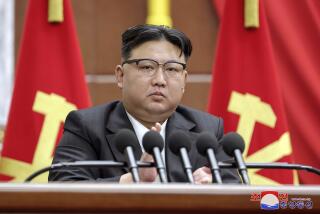U.S. Seeks to Undo N. Korea A-Arms Drive : Weapons: Christopher indicates that Washington will ask Pyongyang to give up whatever it has produced.
- Share via
WASHINGTON — Secretary of State Warren Christopher indicated Friday that the Clinton Administration intends not only to stop the development of North Korea’s still-primitive nuclear weapons program but also to roll back whatever progress it has made so far.
The United States cannot accept any form of nuclear weapons program in North Korea, Christopher asserted in a meeting with Times reporters. He said that the ultimate goal of American foreign policy is to ensure a Korean Peninsula without nuclear weapons.
“We in no sense are tolerating a nuclear program in North Korea,” he said. It was the clearest indication to date that the Clinton Administration intends to ask the Pyongyang regime to give up or dismantle what it has already produced in its nuclear program.
In a television appearance last Sunday, Secretary of Defense Les Aspin had appeared to suggest that the United States might be able to live indefinitely with North Korea’s nuclear program at its current, early stage of development.
U.S. intelligence officials have estimated that the Pyongyang regime now has the material to produce one or two crude nuclear weapons, using plutonium processed after the Yongbyon nuclear facility was closed down in 1989.
“Whatever happened in 1989, the situation is not deteriorating now,” Aspin said in the final television appearance before his resignation Wednesday. “They (the North Koreans) are not developing more plutonium.” The defense secretary said these conclusions were based on U.S. intelligence.
North Korea has been resisting efforts by the International Atomic Energy Agency to inspect its nuclear installations. Last March, the Pyongyang regime threatened to withdraw from the Nuclear Non-Proliferation Treaty because the atomic energy agency wanted to inspect two sites that it believes could contain nuclear wastes. North Korea subsequently withdrew the threat, but it has since been refusing to let the agency make even routine inspections on its soil.
In recent weeks, the United States and North Korea have been engaged in talks aimed at resolving the stalemate over inspections. Clinton Administration officials said that if North Korea will permit these routine inspections, the United States would be willing to talk about normal diplomatic relations and some economic benefits for North Korea.
The most recent of the low-level U.S.-North Korean talks took place in New York City on Dec. 10. “We are awaiting a further response from North Korea,” Christopher told The Times on Friday.
The secretary of state said that the Clinton Administration has not imposed any deadline on North Korea. However, because of Pyongyang’s resistance to international inspections, Executive Director Hans Blix of the International Atomic Energy Agency has said his organization is very close to saying that it no longer can guarantee what is called the “continuity of safeguards” at the North Korean nuclear facilities.
Such a declaration by the agency would mean it is possible that North Korea has diverted further materials from its nuclear plant for possible use in nuclear weapons. Christopher said Friday that the Administration’s ongoing talks with North Korea would end once the agency makes such a declaration.
“The time (frame) depends upon our feeling that they are not changing the situation in North Korea,” the secretary of state said. “As long as it appears that the situation is frozen, then we feel more confident about continuing the diplomatic dialogue.
“But if the IAEA should announce that there is no longer continuity of safeguards of the inspection regime, then I think we would have no choice--or little choice--but to go to the United Nations Security Council for some further action.”
In another apparent rejection of Aspin’s remarks, the secretary of state said that U.S. intelligence-gathering on the North Korean nuclear program “is not a substitute for (international) inspections.
“Our determination is to get inspections of all the (North Korean) plants, to assess whether or not there is a nuclear bomb or some sort of nuclear device there and then to prevent one from being built,” Christopher said .
The secretary of state also disclosed that the United States is keeping China “fully informed” about the negotiations with North Korea.
The aim, he said, is “to have their (China’s) support, and also . . . to lay the basis for their cooperation in the United Nations if the dialogue between North Korea and the United States should not turn out to be productive.”
The dispute over North Korea’s nuclear program illustrates the overall importance of China, he said. In the interview, he repeatedly emphasized the importance of forging what he called a “comprehensive” relationship between the United States and China.
“I see us as needing a comprehensive relationship (with China) that involves non-proliferation and trade and international geopolitical issues as well as the human rights issues,” Christopher asserted.
More to Read
Sign up for Essential California
The most important California stories and recommendations in your inbox every morning.
You may occasionally receive promotional content from the Los Angeles Times.













